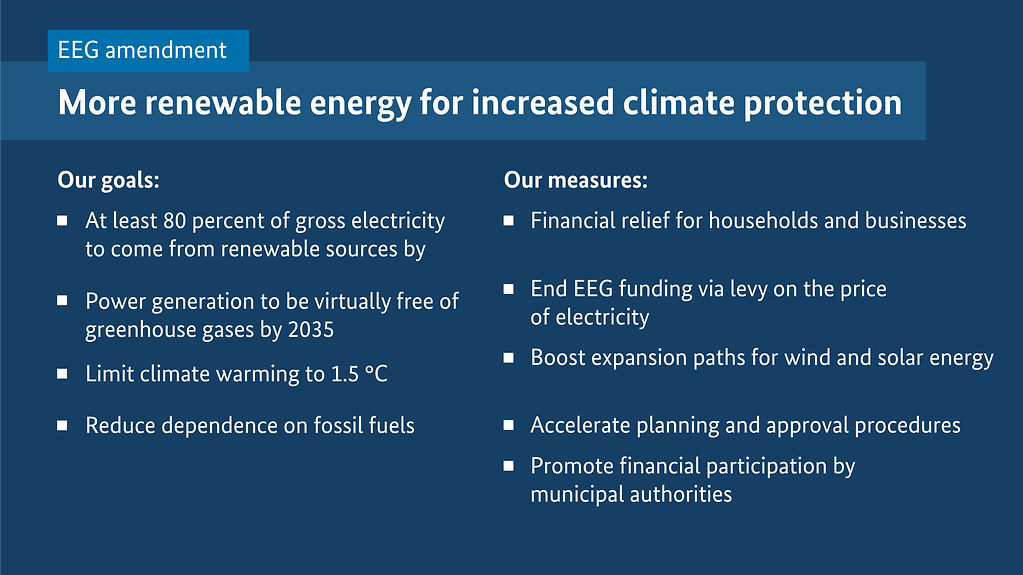EEG 2023
The EEG 2023 is the biggest amendment to energy legislation in decades. It lays the foundations for Germany to become climate neutral. Planning provides for consistent and much faster expansion in order to increase the share of gross electricity consumption that is covered by renewables to at least 80 percent by 2030. The amended EEG will come into effect on 1 January 2023.
4 Min. Lesedauer

The Federal Government’s amendment of the Renewable Energy Sources Act includes a broad package of measures to ease the burden on households and businesses.
Foto: Federal Government
Renewable energies are a central pillar of the energy transition. The expansion of renewable energy sources is intended to make our energy supplies more climate-friendly and less dependent on fossil energy imports. This is a key factor against the backdrop of the Russian war of aggression in Ukraine.
The blockages that have been inhibiting the energy and climate transition for many years are being removed, and renewable energy sources and the required transmission networks will be developed much more rapidly than before. On the occasion of the budget debate in September 2022, the Federal Chancellor pointed out that the future of our energy supply belonged to wind power, solar energy and green hydrogen.
Foundation for Germany’s climate neutrality
For the first time, the new EEG 2023 law will be consistently geared towards achieving the 1.5 degree pathway as set out in the Paris Climate Agreement. The share of renewable energies in gross electricity consumption will almost double within less than a decade. In addition, the speed of renewable energy expansion will be tripled – on water, on land and on rooftops.
The EEG amendment was announced in the Federal Gazette on 28 July 2022. Some parts of the law have already entered into force, and all other parts of the amended law will become effective on 1 January 2023. The new EEG 2023 is part of the Federal Government’s “Easter Package”. Other important components of the package are aimed at expanding the power grid and offshore wind energy. With its Onshore Wind Energy Act the Federal Government also ensures that the land available for wind farms is increased and that approval processes are accelerated.
Renewable energies to take precedence
It has been statutorily determined since 29 July 2022 that renewables are in the overarching public interest and in the interests of public security. This is crucial to be able to increase the pace of expansion. In future decision-making processes they will be given precedence over other interests. This will allow for planning and approval procedures to be accelerated.
80 percent more wind and solar energy by 2030
In order to achieve the new expansion target for wind and solar energy, tender volumes for the period until 2028/29 will be increased considerably. Planning provides that at least 80 percent of Germany’s electricity consumption is to be covered by renewable energies by 2030. This means that the share of overall consumption is to be almost doubled, as electricity production is expected to rise from 600 terawatts to 800 terawatts by the end of this decade, to cater for more electrified industrial processes, heat production and electric mobility.
Funding for electricity stores and power plants with green hydrogen
The EEG 2023 enables the Federal Government to provide funding for innovative concepts for combining renewable energy sources with local hydrogen-based electricity storage. This can help to compensate for the volatility of electricity production using renewable energies. Funding is to be provided for so-called hydrogen-powered sprinter plants that use green hydrogen.
Higher remuneration for solar systems
Higher remuneration rates for new photovoltaic systems that are installed on rooftops have applied since 30 July 2022.
In future, it is possible to combine systems with full and partial feedi-in. This will make it worthwhile to cover entire roofs with solar systems, even for private consumption.
For smaller systems, the network operator usually does not need to be present during connection any longer, to allow for systems to be taken into operation more quickly.
Citizens’ energy cooperatives now easier to set up
The law also provides new incentives so that more is done to ensure the energy transition becomes locally accepted and established. From 2023, wind and solar projects run by citizens’ energy cooperatives will be exempted from tendering duties to allow for a less bureaucratic process. Remuneration for citizens’ energy projects is also available without a tendering process.
Higher financial participation of municipalities for wind energy
Financial participation will also be possible for onshore wind farms with other forms of direct marketing from 2023. In addition, operators of existing onshore wind farms and existing ground-mounted plants can seek financial participation of the municipalities. Such participation in expanding renewables is intended to further improve local acceptance and is to become the norm in the future.
Elimination of surcharges for electricity for private supply
Producing electricity for private consumption is becoming far more attractive, as no more surcharges will apply for private consumption and direct delivery beyond the grid connection point. The surcharge under the Act on Combined Heat and Power Generation and the offshore grid surcharge will only be charged for using electricity from the public grid.
The EEG levy was dropped in July 2022
The EEG levy will not just be permanently reduced to zero from 2023 but abolished completely.
Electricity consumers have not had to pay the EEG levy since 1 July 2022. This is a part of the relief packages provided by the Federal Government.
To this end, renewable energies will in future be financed out of the Federal Government’s specially earmarked “Energy and Climate Fund”; there will no longer be a levy on the price of electricity to fund renewables. This responds to a core concern set out in the coalition agreement.